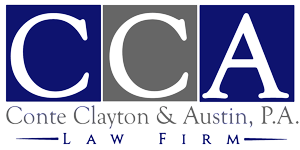Simplifying complex legal processes during difficult times
The last thing you want to do while grieving the loss of a loved one is try to figure out the probate system in New Jersey or Florida. There are many steps involved in putting estates through probate, and the process can add stress to an already difficult time.
At Conte Clayton & Austin, P.A., our goal is to make the complex system of probate and estate administration simple and manageable, ensuring the legacy of your loved ones is honored without undue stress on your part.
We operate with a straightforward approach because we believe in focusing on what matters most: your peace of mind.

What Is Probate?

Probate is the legal process to administer a person’s Last Will and Testament and financial affairs after they’ve passed away. During probate, the court reviews the deceased’s will to ascertain if everything is in order. Probate isn’t just about rubber-stamping documents; it involves thoroughly reviewing the deceased’s assets, settling any outstanding debts and taxes, and ensuring what’s left goes to the right people.
How the Court assesses an estate will depend, in part, on the presence of a will and other estate planning documents. A will articulates the deceased’s wishes, which the court strives to honor to the fullest extent possible.
However, if there is no will, probate ensures the estate’s distribution aligns with state laws. While it might sound daunting, it serves an essential purpose: to orderly transfer ownership of assets, providing clarity and closure for those moving forward.
Does every estate have to pass through probate?
Most estates go through the probate process in New Jersey and Florida. However, some assets are not subject to probate, such as those held in joint ownership with the right of survivorship, or placed in trusts.
Careful asset planning can streamline probate for families. Working with an experienced estate planning and probate attorney allows you to create a clear plan of action for probate, minimizing delays and headaches along the way.
The Estate Probate Process in New Jersey and Florida
There are numerous steps involved in probate in New Jersey and Florida. Because probate is required for most estates, having clear expectations can make the process more manageable.
- Initiating probate: Probate is initiated when the deceased’s will and death certificate are filed with the local probate court.
- Appointing an executor or administrator: An executor or administrator is designated to oversee the process of settling the estate’s settlement.
- Notifying heirs and beneficiaries: All potential stakeholders are informed that the deceased’s estate is in probate.
- Managing estate assets and debts: An inventory is taken of the estate’s assets and debts in the estate to ensure all responsibilities can be met.
- Distributing probate estate assets: Assets are distributed to the rightful heirs and beneficiaries according to the provisions of the will or state law.
How long probate takes will depend on the facts of each situation. Depending on a variety of factors, this process can range from several weeks and several years.
Factors That May Complicate Probate
While a clear, well-executed estate plan can simplify probate, some factors may increase the complexity of finalizing an estate. The biggest one is not having a will in the first place, but other contributors may include:
- Estate size and assets
- Issues with validity of the will
- Number of heirs and beneficiaries
- Challenges to the will or other aspects of the estate plan
- Family dynamics
- Conflicts or disputes with creditors
At Conte Clayton & Austin, P.A., our probate attorneys offer clients the benefit of decades of legal experience. We’re here to help you find a personalized solution so you can focus on honoring your loved one instead of untangling legal issues.

What Is Estate Administration?
The goal of estate administration is to ensure an estate is appropriately managed and settled after an individual dies. Each estate is unique, meaning that obligations may vary widely. However, there are general responsibilities estate administrators need to meet:
- Asset collection: Identifying everything the estate owns, from bank accounts to baseball card collections.
- Debt and tax settlement: Paying off any outstanding bills or tax obligations.
- Asset distribution: Distributing any assets to heirs or beneficiaries.

Who acts as an Estate Administrator?
An estate administrator or executor can be appointed by the court or an individual can apply to be the executor if an individual passes away intestate. In most cases, it is best for an executor to be selected during the estate planning process. This provides greater peace of mind to the grantor that their estate will be administered by someone whom they trust, and who understands their wishes and will act in their best interest even after they have passed.
In choosing an executor, it’s important to consider who might be well-suited for this role. Engaging an estate planning attorney can ensure the estate administration is carried out by someone with a deep understanding of New Jersey or Florida’s legal status, processes, and more.
That’s where the team at Conte Clayton & Austin, P.A. can help. Our experienced estate planning attorneys offer compassionate service that relieves the burden of administering an estate during a difficult time.
How Our New Jersey and Florida Probate and Administration Attorneys Can Help You
At Conte Clayton & Austin, we recognize that administering an estate intersects with other legal concerns, requiring a holistic approach to ensure estates are satisfactorily settled. We can assist with:
● Filing necessary documents
● Determining heirship and beneficiaries
● Managing and appraising estate assets
● Resolving disputes
● Handling estate taxes and finalizing financial affairs
● Distribution or liquidation of assets
Our experience extends to related practice areas, such as business transactions for estates involving business interests or real estate law for handling significant assets after you die.
Contact Our Estate Administration Law Firm
If you’re facing the challenges of probate and estate administration, our New Jersey and Florida probate attorneys are here to help.
Don’t wait until legal issues arise to choose an attorney. Contact Conte Clayton & Austin, P.A. to schedule a consultation, and let us provide the guidance and support you need during this difficult time.
.

New Jersey and Florida Probate FAQs
How long does probate take in New Jersey or Florida?
The duration of the probate process in New Jersey or Florida can vary widely, depending on the complexity of the estate, the clarity of the will, and any disputes among heirs or creditors. The process can take anywhere from a few months to over a year.
How much does probate cost in New Jersey or Florida?
The cost of probate in New Jersey or Florida can include court fees, attorney’s fees, appraisal costs, and other expenses. While the total cost can vary significantly based on the estate’s complexity and the length of the probate process, our attorneys work diligently to manage costs efficiently, providing clear, upfront guidance on expected expenses.
Is it necessary to file probate in every state where the decedent held assets?
Probate is generally required in all jurisdictions in which the decedent held assets that are subject to probate. We frequently assist clients in administration of multi-jurisdiction probate, where, for example, the decedent resided in New Jersey and owned a vacation home in Florida. In those cases, a simplified, ancillary probate process is often available.
Are life insurance proceeds subject to probate?
Generally, the decedent’s life insurance proceeds are not subject to the probate process, assuming the beneficiary designations were appropriately selected




